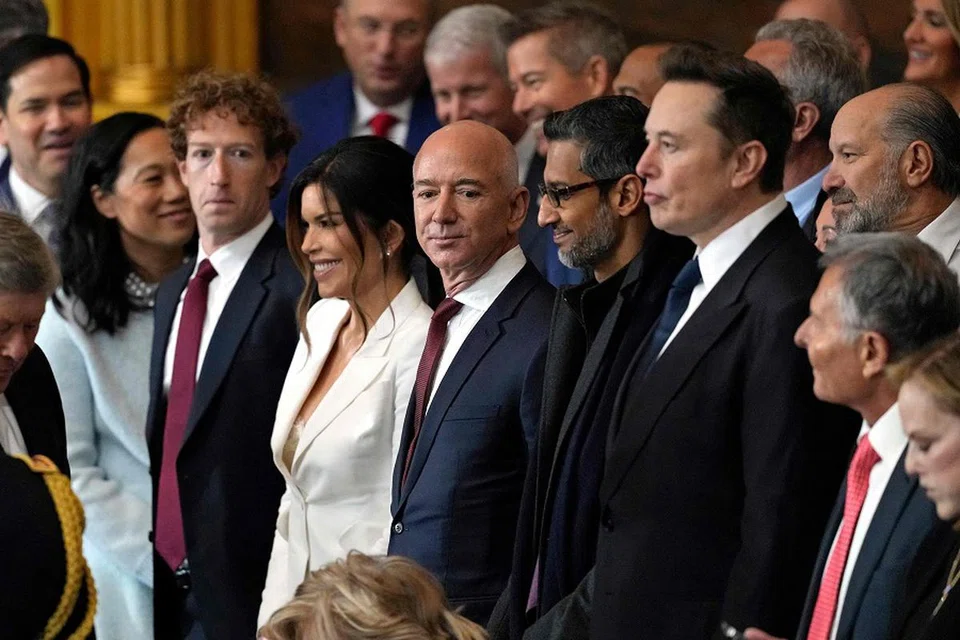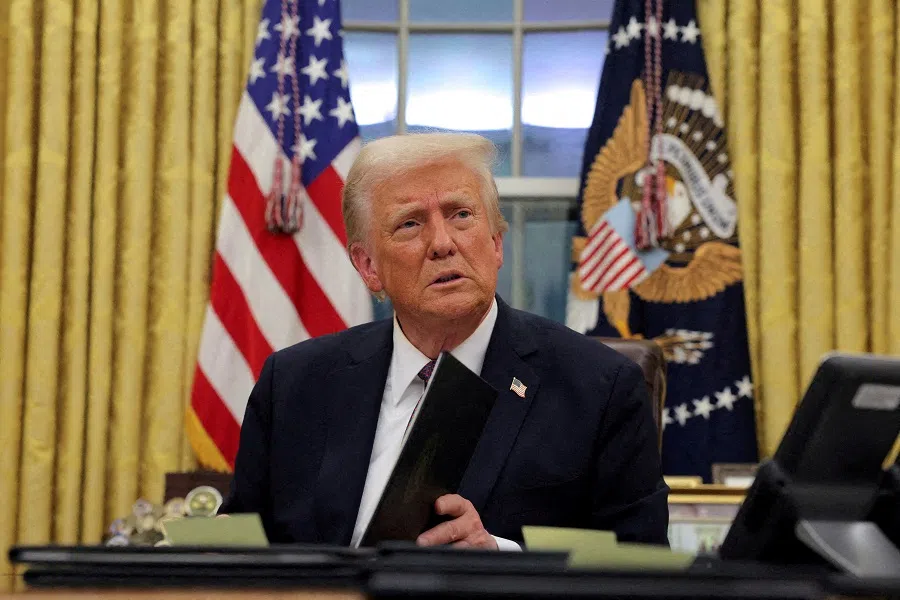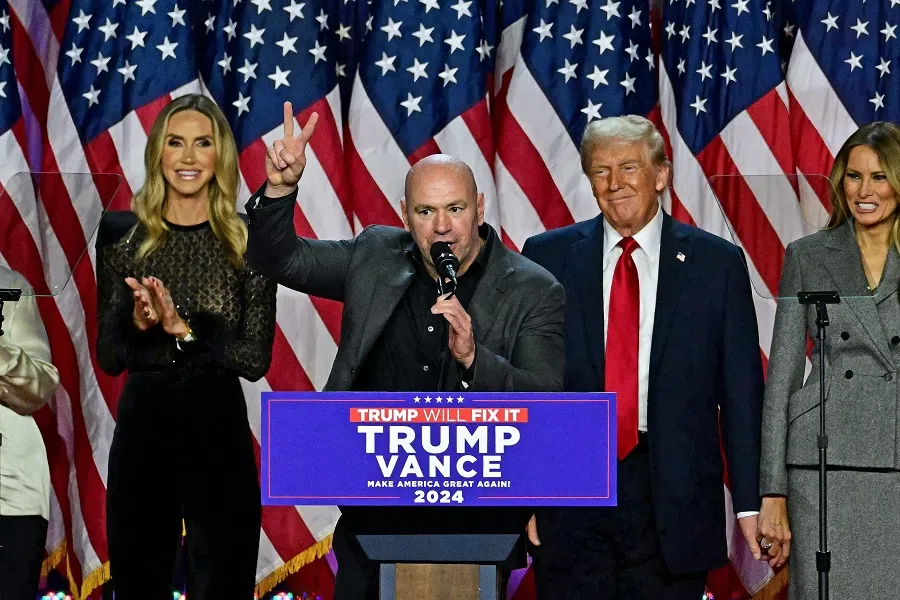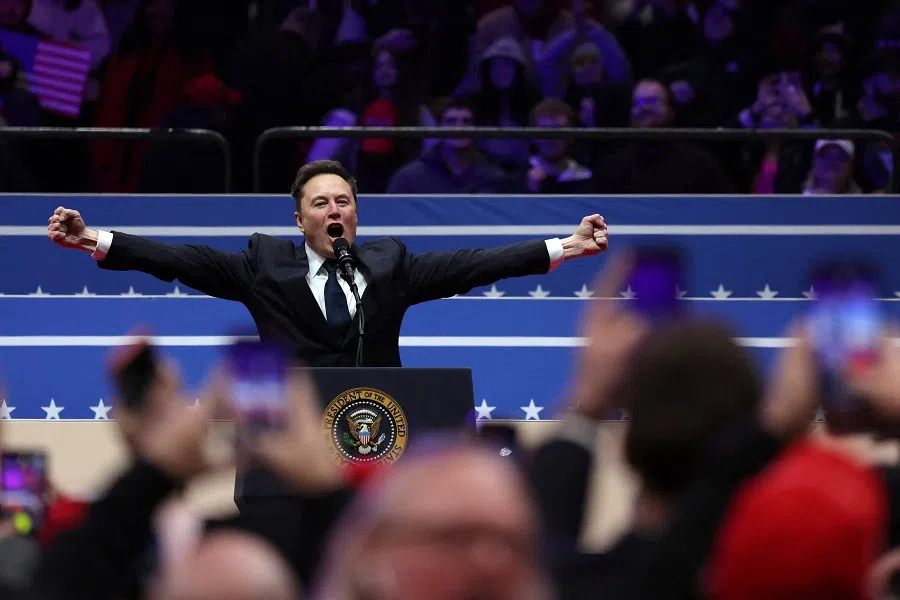Broligarchy: When businessmen govern America
With Trump’s return to the White House, it seems there is a group of wealthy and powerful tech moguls who are eager to support him, as they see that he is likely to implement policies that would favour their industry. This is reminiscent of the oligarchy system in Russia. Former journalist Goh Choon Kang looks into the phenomenon.

With Trump’s re-election, a group of Silicon Valley tech moguls who support him have been thrown into the political spotlight. Notably, Tesla’s CEO Elon Musk moved from behind the scenes to a prominent role — akin to becoming a sworn brother to Trump. As a result, a new term, “broligarchy”, has gained traction in newspapers across the US and UK, with some commentators even suggesting that the US has entered the “broligarchy era”.
This term is a portmanteau of bro and oligarchy, literally meaning brotherhood oligarchy. It refers to a group of men who have become wealthy through Silicon Valley, and are now a new force capable of influencing US politics. We might describe it for now as a “tech mogul oligarchy”. Some of these tech moguls, like Musk, backed Trump during his campaign, while others, like Meta’s CEO Mark Zuckerberg, shifted their stance to support him soon after his election.
These tech billionaires have clearly identified that Trump would implement policies favourable to their internet tech businesses (America First), including relaxing restrictions on the content and speech on social media platforms like Facebook, X, YouTube and Instagram. The ambitious Musk hopes to leverage Trump’s influence to advance right-wing politics; this is why he sharply criticised UK Prime Minister Keir Starmer, and strongly supported Germany’s Alternative for Germany party as well as Canada’s opposition Conservative party.
These new oligarchs are all male, flushed with both power and money reminiscent of Russian oligarchs, poised to shape the future direction of US politics.
Rise of the broligarchy
After the collapse of the Soviet Union, many state assets in Russia — such as oil, steel, banks and the media — were privatised, leading to the rise of wealthy individuals who swiftly amassed wealth, monopolised markets and gradually infiltrated politics, becoming oligarchs. Their clout was curtailed only when Putin came to power and initiated reforms. Now, Western media seem to perceive a US-style oligarchy emerging; hence the new term. These new oligarchs are all male, flushed with both power and money reminiscent of Russian oligarchs, poised to shape the future direction of US politics.
For tech moguls to surround the president, and directly participate in politics (Musk and another wealthy individual, Vivek Ramaswamy, took charge of the newly established Department of Government Efficiency) is unprecedented — such an extent to which businessmen would meddle in politics is unparalleled. Indeed, Trump, at his core, is also a businessman and with so many tycoons flattering him, he is understandably thrilled — Trump stated that “everybody wants to be my friend”.

This is indeed the case; recently, tech magnates have been queuing up to dine with Trump at Mar-a-Lago, offering gifts for his inauguration, contributing US$1 million each to the inauguration fund. This has driven the fund to an unprecedented US$200 million. Spending such a fortune on a presidential inauguration is more extravagant than a royal event, yet for these tech tycoons, it is just a drop in the ocean. Reports suggested Musk may have spent several hundred million supporting Trump’s campaign.
US media has reported that billionaires, including Musk, Zuckerberg, Apple CEO Tim Cook, Amazon founder Jeff Bezos, Google CEO Sundar Pichai, OpenAI co-founder Sam Altman and PayPal co-founder Peter Thiel (a major supporter of Vice-President JD Vance), have each arranged for contributions of US$1 million to Trump’s inauguration fund through their companies. Other major US companies also eager to contribute include Boeing, Microsoft, Ford and Toyota. Some UK and US newspapers described the situation as everyone lining up to “kiss the ring” (on Trump’s hand). This phrase is clearly derogatory — unlike kissing the pope’s ring — and essentially mocks them for their sycophancy and flattery.
But these social media giants could never have anticipated Trump’s return to power four years later. Neither would Twitter have expected the arrival of Musk...
Influence of internet technology
Regardless, the current situation is one where a group of plutocrats occupies the centre of power in the US. They are nouveau riche, different from the traditional interest groups, or what Trump refers to as the “deep state”. The advancement of internet technology created this new group of billionaires. The products that they created, such as social media platforms, penetrate deep into people’s lives, and their wealth continues to grow.
However, not all tech leaders willingly support Trump. Following the Capitol attack on 6 January 2021, social media giant Twitter permanently suspended Trump’s account. Shortly after, Facebook and YouTube also took measures to ban Trump from their platforms. Google, Apple and Amazon cut off the app Parler, which Trump supporters heavily use, and stopped providing related web services to the app.
But these social media giants could never have anticipated Trump’s return to power four years later. Neither would Twitter have expected the arrival of Musk, who bought the company, implemented major personnel changes and fully supports Trump. Now that Trump has returned to power, they have also shifted their stance accordingly — this is what businesspeople are like, and is hardly surprising. However, this also presents new challenges to American democracy.

Among them, Zuckerberg’s shift is the most obvious. On 7 January, he announced that Meta will be ending its third party fact-checking programme and moving to a Community Notes model similar to the one X uses. Also, to signal its alignment with Trump’s team, Meta appointed former Republican official Joel Kaplan to be its chief global affairs officer, as well as Ultimate Fighting Championship (UFC) President and close Trump ally Dana White to its board of directors.
Modern-day ‘robber barons’
On 15 January, outgoing US President Joe Biden expressed his concerns during his farewell address from the Oval Office, warning against the dangerous concentration of power in the hands of very few ultra-wealthy people. He thinks that an oligarchy is taking shape in the US, and that if their abuse of power is left unchecked, it will seriously threaten their entire democracy and people’s basic rights and freedoms — he compared the situation to the robber barons of more than a century ago.
Biden also named the current tech oligarchs surrounding Trump the “tech-industrial complex”, echoing former US President Dwight D. Eisenhower’s farewell address, which warned of the potential threat posed by the “military-industrial complex”.
The robber barons were the wealthy and powerful businessmen of the late 19th century, during the US’s Gilded Age, who amassed their fortunes through ruthless and even unethical business practices, earning them public disdain. Biden also named the current tech oligarchs surrounding Trump the “tech-industrial complex”, echoing former US President Dwight D. Eisenhower’s farewell address, which warned of the potential threat posed by the “military-industrial complex”.
While Musk has turned the X platform into a right-wing mouthpiece, Zuckerberg, in an effort to please Trump, has ended fact-checking services in the US. “Americans are being buried under an avalanche of misinformation and disinformation… Social media is giving up on fact-checking. The truth is smothered by lies told for power and for profit,” Biden asserted.
Yet Zuckerberg’s actions have earned Trump’s approval. With internet technology and social media permeating every aspect of everyday life, if misinformation and hate speech becomes even more rampant as a result, the consequences will truly be dire.

The dominance of the military-industrial complex in US military and foreign policy is indisputable. Plutocracy, or plutarchy — the control of politics or society by the wealthy and vested interests — has long taken root in the US. The only difference now is the emergence of a new set of wealthy individuals with tech backgrounds.
There has been a change in who are the wealthy, but the essence of plutocracy has not changed. This is a cancerous tumour in American democratic politics that is difficult to remove. Entering the era of broligarchy where businessmen rule the country, it is feared that the cancerous tumour will only worsen, rather than make America greater.
This article was first published in Lianhe Zaobao as “美国进入兄弟寡头政治时代?”.





